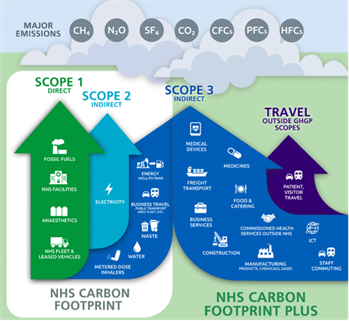Background

This Green Plan sets out the intentions of Northampton General Hospital NHS Trust (NGH) In 2015, The Lancet reported that Climate Change was the biggest threat and the biggest opportunity for human health of the 21st Century – threatening to undo 50 years of positive public health achievements.
The recent IPCC report published in August 2021 stated the following are now likely scenarios:
- We will pass a 1.5°C increase in temperature between 2030 and 2035
- We will reach a 2°C increase between the early 2040s and early 2050s
In June 2021, the UK Government published its latest risk report with the following noted with respect to healthcare:
- Chances of a hot summer have increased to 1 in 4 and will be 1 in 2 by 2050
- Heat related deaths are expected to increase from 2,500 per year to 7,000 by 2050
- 90% of hospital wards are at risk of overheating
- 10% of hospitals are at significant flood risk
- New diseases are expected, for example 10% of sheep and deer ticks are carriers of Lyme disease
- There will be heat related productivity losses
- Climate change overseas will have a cascading impact
- There are risks to supply chains, particularly food, but also IT and medicines
- There are risks to the electricity supply, particularly with the increasing move to electrical heating
The NHS has been actively working to reduce its carbon footprint and reduce its overall negative impact since 2009. However, the NHS is responsible for over 5% of UK carbon emissions, uses more single use plastic than any other sector, creating 133,000 tonnes of plastic waste. In addition, 5% of travel in England is related to the NHS, which adds over 7,000 tonnes of NOx and 330 tonnes of PM2.5 pollution.
In October 2020 the NHS declared that by 2040 it will be carbon net zero for all of its Scope 1 and 2 emissions as detailed below with everything else, its carbon footprint plus, being net zero by 2045.

Within the NHS Long Term Plan and the Standard Contract 21/22 there are a number of sustainability measures:
- Moving to lower carbon inhalers
- Cutting business mileage by 20% by 23/24
- Ensuring 90% of the fleet uses low emissions engines by 2028
- Reducing single use plastics
- Develop and operate an expenses policy or staff that promotes sustainable travel choices
- Reduce the use of desflurane to less than 10% by volume
- Adapt the premises and manner in which services are delivered to mitigate risks associated with climate change and sever weather
- Reduce water and waste usage
- Sign up to the plastics pledge
- Create a provision to maximise the rate of return of walking aids.
- Give due regard to the potential to secure wider social, economic and environmental benefits for the local community and population in its purchase and specification of products and services
Locally, the two unitary authorities have declared a climate emergency and that they would aim for net zero for scope 1 and 2 by 2030. The University of Northampton have recently also declared they will be carbon zero for Scope 1 and 2.